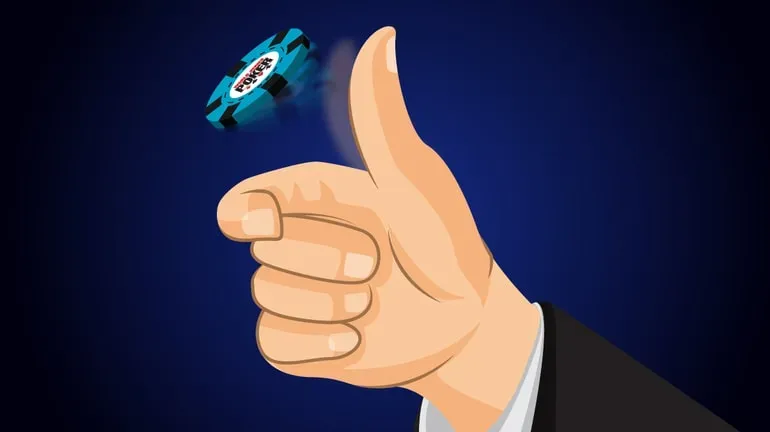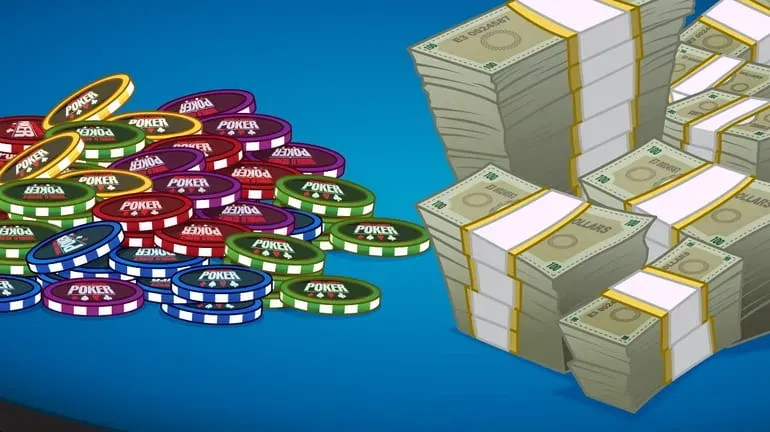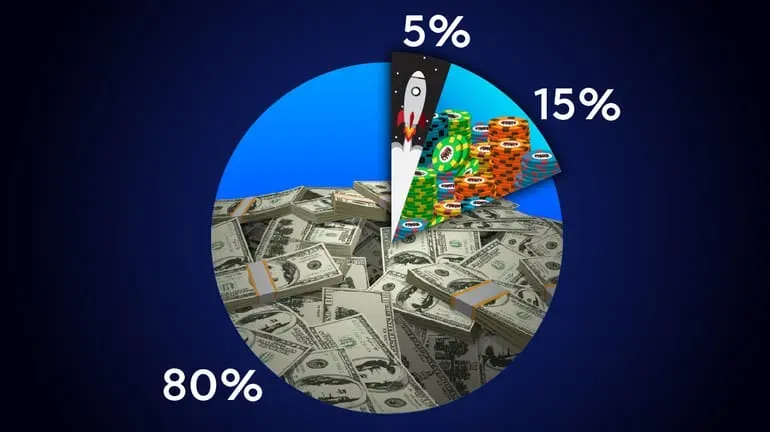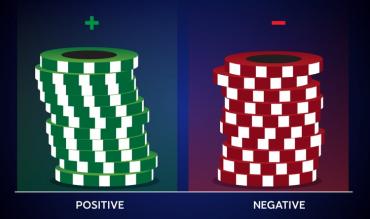Let me ask you a question.
I want you to pretend you are playing a Sunday online tournament that has 7,000 people in it. It pays 16% of the field. You have a 50% ROI in this major.
Let’s say you play this tournament every Sunday for ten years.
For a decade, you never miss a Sunday.
You never go to a wedding.
You never go to a live tournament.
Nothing.
What percentage of the time do you think you would lose money over these 10 years?
Many people seem confused by this question. “I have a 50% ROI, and I play every Sunday for ten years? I have to be profitable almost always then!”
That is incorrect, however. Variance simulators have shown that this player if they play for 10 years with a 50% ROI, will be losing money 40% of the time!
This sample literally has a standard deviation of $100,000!
Why is that? Allow me to explain.
What Is Poker Variance?

Variance discusses how much an individual player wins or loses based on luck. If you flip a coin a hundred times, you would expect to win 50 times. If you win 54 times, then you have experienced positive variance. If you win 46 times, you would have experienced negative variance.
Many times, in No-Limit Holdem, you will be pursuing a minimal edge, and the spot will not come up that often. In these cases, a small bad run can cause quite a bit of negative variance.
It can be confusing for first-time players to discover they’re playing well but still losing money. They question themselves:
“Am I playing poorly, or is the deck just hitting the other players?”
Are You Really Running Bad? Or Just Imagining It?
There is a way to find out if you’re genuinely running bad. The way you do so is to track the number of big blinds you win versus the hands you play.
This is especially illuminating in tournament poker, where the higher stakes and later stages can erase the earnings of several solid early levels. You can even get automated software to analyse your hands after you play and come up with these numbers for you.
One nifty feature of this software is that it will also calculate your Expected Value (EV). Your EV is whatever your Big Blind per 100 (BB/100) winrate would be if all the showdowns broke exactly fair.
In reality, if you do a coin flip for your 100 big blind stack, it’s going to go on your ledger as a 100 big blind win or a 100 big blind loss. The EV would simply calculate the flip as neutral, 0 big blinds. This creates a more accurate summation of how you play poker.
You can calculate your Big Blinds Won Per 100 Hands by pen and paper or with software, but it’s great to know these numbers. They will let you know if you’re susceptible to variance.
If your BB/100 is 3 big blinds, that’s not bad! However, it is incredibly susceptible to variance. Alternatively, if your BB/100 is 10 big blinds, then it’s going to be much more difficult for you to run poorly.
Game Selection and Variance

Your choice of game is also crucial.
If you play poker tournaments, as we’ve previously seen, your variance can be enormous. Why is that? Because in tourneys, not all big blinds are created equal. You could be earning 10 BB/100 early on, but it won’t matter if you run poorly in deeper stages.
So, you might be reading that and thinking, “But, I want to play tournaments, I love them! Don’t many guys make their living playing tournaments?”
Yes, they do, but many professionals are value hounds. They understand that a more extensive field indicates more variance, so they keep their buy-ins low and their fields small. They play constantly. They know that the more small tournaments they play, the more likely they are to neutralise negative variance.
The problem with big tournament fields is that, while they’re a ton of fun to play, they’re challenging to run deep in. If you play a 100 or 200-person field, you can expect to run deep in those tournaments continuously. If the field numbers in the thousands, it might be once a year you run deep. The variance you experience in those situations will have an outsized effect on your results.
To combat variance, it is a good idea to have a diverse poker portfolio. When I started playing professionally, I was fortunate enough to win a larger online tournament. The prize wasn’t tremendous, but it meant a great deal to a teenager.
People kept telling me how good I was at poker, but two months later, I would stop playing tournaments altogether. I could tell people were wrong. I had been fortunate to win that tournament, and I knew negative variance could befall me at any moment.
I committed to learning how to play cash games. It turned out I was the worst cash game player in the world when I was started. Yet, a year later, I could hold my own in low stakes cash games almost anywhere on the internet.
As I worked harder, I was able to move up to 200 NL and 400 NL, creating a good living for myself.
A Diverse Poker-Playing Portfolio

Since then, it has become my personal opinion that poker players should divide their poker playing time this way if they want to avoid variance:
- 80% of hours should be devoted to cash games.
- 15% of hours should be devoted to small field low-stakes tournaments
- 5% of hours should be devoted to moon-shots.
You can play one HUGE poker tournament every Sunday but try to keep it to that. Remind yourself that this is gambling. You’re paying for an experience and a little excitement. If some money comes out of that, so be it.
The reason you want to spend most of your time playing cash games is simple: All the big blinds are worth the same in a cash game, assuming you don’t regularly change limits.
If you run poorly for a short time in a cash game, it doesn’t really matter. If you’re a winning player, you can just keep playing until variance swings in your favour. That is far more difficult to accomplish in tournaments.
Additionally, cash games tend to play deep-stacked. This will teach you how to play flops, turns, and rivers. That is more difficult to accomplish with short-stacked tournament games.
Finally, if you play six-max games, you will constantly be placed in close quarters combat. You’ll learn how to handle bullies quickly. The constant exposure to difficult spots will increase your poker IQ rapidly.
I hope these tips have been beneficial to you and your game.
Good luck to all of you.


